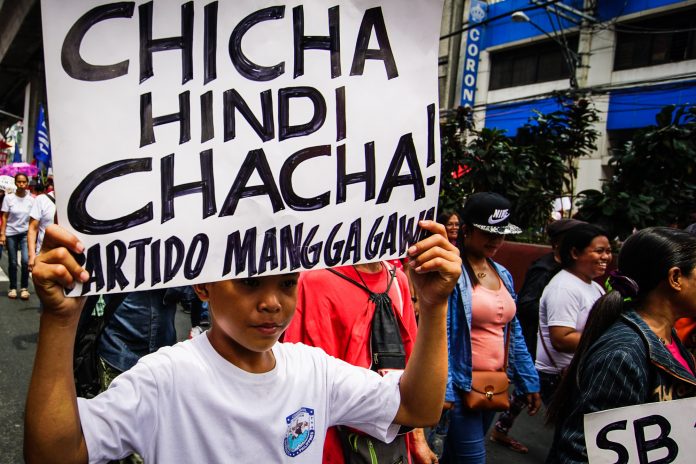Representatives are dancing Cha-Cha (Charter Change) in two steps. Senators refuse to swing along. Given the high stakes, a ballroom brawl is likely. Here’s why:
Congress is bicameral. It has a Senate and House of Representatives, the 1987 Constitution states in Article VI, Legislative Department, Section 1.
Senators are elected at large and Representatives by legislative district, Sections 2 and 5 detail. They differ by numbers: Senators are fixed at 24, Reps may increase with the opening of new districts and partylist slots. Also in age: at least 35 for Senators, 25 for Reps. And tenures: six years for Senators, plus one re-election; three years for Reps, plus two re-elections.
Powers diverge, other provisions declare. Senators ratify treaties. Reps propose national budgets, taxes, and franchises. In impeachments, Reps prosecute while Senators judge. They separately debate and pass bills.
But there’s a kink. Faulty worded is Article XVII, Amendments or Revisions, Section 1:
“Any amendment to, or revision of, this Constitution may be proposed by: (1) The Congress, upon a vote of three-fourths of all its Members; or (2) A constitutional convention.”
The miswording contradicts bicameralism. If “by a three-fourths vote of all its members”, Reps now numbering 316 will surely drown out the votes of 24 Senators.
A rush to adjourn the 1986 Constitutional Commission caused the lapse. Con-Com voting on the nature of Congress came on its penultimate session, in which bicameral won by one vote over unicameral. The Committee on Style missed to put “separate voting” before final approval. And so, the Filipino people ratified that section as is.
Since then, Reps have tried many times to amend or revise the Constitution by their sheer numbers. Senators have refused to participate because of fewness.
There’s a third way of Constitutional amending – People’s Initiative. Article XVII, Section 2 states:
“Amendments to this Constitution may likewise be directly proposed by the people through initiative upon a petition of at least twelve per centum of the total number of registered voters, of which every legislative district must be represented by at least three per centum of the registered voters therein.”
Comes now the latest two-step Cha-Cha.
Step 1, businessmen and lawyers placed pricey TV ads blaming poverty on Constitutional restrictions on foreign investors. Supposedly needing lifting are caps on foreign capital: 40 percent in natural resources, utilities, and education; and 30 percent in advertising.
Reps proclaim to endorse it.
But wait. The PI petition does not mention the economy. It instead states:
“We are aware that the petition shall be filed with the Commission on Elections for the proposal to amend Article XVII, Section 1(1) … The amendment shall be:
“‘(1) The Congress, upon a vote of three-fourths of all its Members, voting jointly, at the call of the Senate President or the Speaker of the House of Representatives; or xxx’
“We fully understand the Proposition, its rationale, its advantages, as well as the consequences and effects, as we have read the full text and contents thereof, which were explained to us in our dialect or in a language known to us.
“We know that our signature/s constitute our approval of the proposed constitutional amendment and consent to the filing of the instant petition. Further, we hereby authorize Atty. Anthony A. Abad et. al., to cause the filing of the petition and perform any and all acts necessary in furtherance thereof.”
Once the minimum number of petitioners is reached and verified, Comelec shall set a plebiscite. At least P13 billion will be spent, Chairman George Garcia said.
All 24 Senators are against the petition that will emasculate them.
Step 2, with the amendment via PI, Reps themselves can then propose more amendments. They need not limit themselves to economic provisions.
Nothing can stop them from entertaining other amendments and revisions. Like, switching to unicameral congress, or presidential to parliamentary system, or centralized to federal form.
Reps can also propose extension of their terms. As well, lifting re-election limits. And deletion of that pesky provision that requires them to legislate a ban on their political dynasties.
Three of every four Reps are political dynasts. They will rule forever in provinces, cities, and municipalities.
No need to worry about mass protests. Fifty percent of Filipinos are poor, and 30 percent are near poor – all willing to exchange democratic rights for some cash handout.
Jarius Bondoc is an award-winning Filipino journalist and author based in Manila. He writes opinion pieces for The Philippine Star and Pilipino Star Ngayon and hosts a radio program on DWIZ 882 every Saturday. Catch Sapol radio show, Saturdays, 8 to 10 a.m., DWIZ (882-AM).
The views expressed in this article are the opinions of the author and do not necessarily reflect the editorial stance of LiCAS News.









